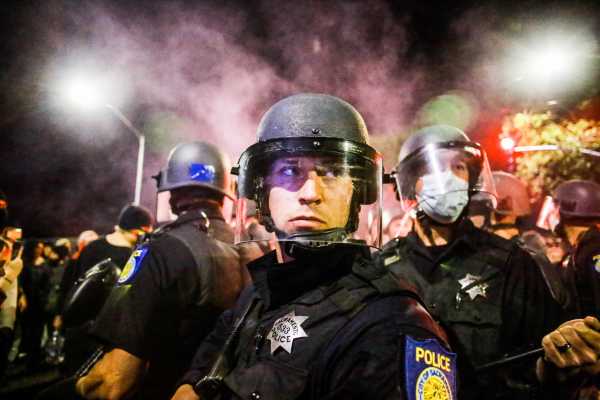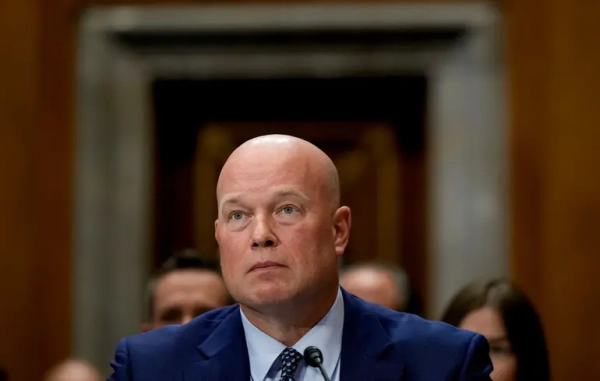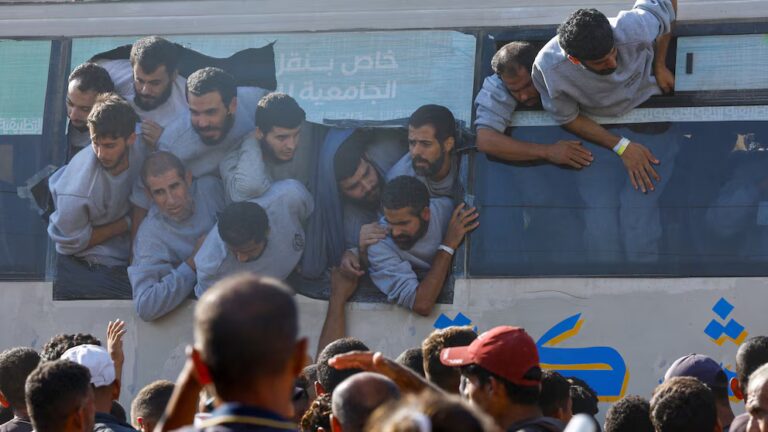
Patrick Skinner spent a decade running counterterrorism operations overseas for the CIA. He worked in Afghanistan, Iraq, and Jordan; met with kings and presidents; rose through the ranks. But he came to believe he was part of the problem, that the very premise of the work was flawed. So he came home, and joined the police force in Savannah, Georgia, where he grew up.
I first learned about Skinner in a New Yorker profile. Then a friend mentioned his Twitter feed to me: There, Skinner reflects, in a thoughtful, continual stream, on the work of policing, the importance of treating your neighbors like neighbors, the daily work of deescalation, and the behavior of his menagerie of pets.
Skinner has been particularly outspoken in the aftermath of George Floyd’s death. “We have to change our profession,” he wrote. “We aren’t warriors. We aren’t at war with our neighbors.”
I spoke with Skinner by phone on Sunday. He emphasized that his views are his own, and he wasn’t speaking on behalf of his department, or all police. But what he has to say is, I think, important. A transcript of our conversation, edited for length and clarity, follows.
Ezra Klein
What did you see when you watched the video of George Floyd’s death?
Patrick Skinner
A murder. No semantics. No justification. They just killed that guy. I drove home and in a six-minute commute, I was in tears. And it was that I saw the other cops in the video. One of them even looked like me. They were stopping the bystanders, telling them to get back. It’s not just that this cop did this. The other cops stopped anyone from stopping him.
Ezra Klein
What should they have done?
Patrick Skinner
They should have arrested the cop! Ideally, you’d just push the cop off. Tell him to knock it off. That would’ve ended it. When people have handcuffs on, they are legally in your custody. You have to care for them. What happens to them is your fault. If someone is kicking the windows out of the car, which I’ve had done, you need to take them out of the car. You need to do something. But this wasn’t that. And even if there had been, there was no justification. He just sat on his back. Floyd said he was dying, and he died.
If a police officer sees another police officer doing that, they are bound to stop him. I could see that cop, who was younger than me, he keeps looking back at what’s happening. The people in the community are yelling. They’re saying, “You’re killing him.” You can see this cop — I want to be charitable, he was torn, but he wasn’t torn enough to act. The crime had switched from counterfeit [Floyd was suspected of trying to pass a fake $20 bill] to an assault. And the assaulter was the cop. There is nothing to say to justify it. Nothing.
Ezra Klein
Over the past couple of nights, as you’ve seen the collisions between police and protesters, what has that looked like to you?
Patrick Skinner
It looks like what we designed. I’m a big believer that the police shouldn’t act like the military. We shouldn’t dress like the military. We shouldn’t have military weapons. When you can’t tell the difference between the police and the National Guard, that’s a big problem. But police have been militarized. This is the result of that. And I’m sympathetic to the police. When a protest tips into a riot, when you have thousands of people who’re screaming, and it’s a visceral, pulsing thing, it’s terrifying. But the whole point is you can defuse it. And the time for deescalation is years ahead of that. And a lot of places aren’t doing that.
So the police are now in a terrible position. Ninety-nine percent of the people are protesting. And it’s a protest, not a parade. For anything to change, there has to be annoyance and conflict. I get that. But the people who are throwing rocks and bricks and setting fires, that’s a big deal. And then the focus will quickly be on how to handle people setting fires. It’s sad. It’s already happening. We’re already talking about the response to the riots, not the cause of the protests.
Ezra Klein
You did counterinsurgency work overseas for a decade, as part of the CIA. how much of that thinking do you see here? How much are American communities treated like an internal insurgency that needs to be restrained?
Patrick Skinner
I see it 100 percent. It’s the same thing. I got more hazard pay over there, I guess. We spent so much money to do so much damage. We kept saying we needed the community on our side, but everything we did made sure we wouldn’t get the community on our side. We put all our efforts and money into whoever supported us. We go for the leader or alleged leader who agrees with us most. We’re trying to say we’re in a war zone, but they should like us. The answer overseas was to leave. If you don’t want to be seen as an occupying army, don’t occupy the country. But we live here. We can’t leave.
Ezra Klein
You write often about policing with “neighbor” mindset and training others to do the same. What is neighbor mindset?
Patrick Skinner
It’s the exact opposite. I don’t think of it as a mindset; I just think of it as a truth. The neighbor mindset sounds so cheesy, but it’s so powerful: We all matter or none of us do. I live here. I can’t know everybody in Savannah. But I call everyone my neighbor, because they literally are. And I can’t put my knee on the neck of my neighbor. He might resist arrest. I get that. But you don’t sit for eight minutes with your knee on the neck of your neighbor.
I do a lot of recruit training and I say: This is not semantics. If they’re your neighbors, you can’t treat them this way. There’s going to be a task force and recommendations, and they’ll sound really good. But a friend told me once: Grand gestures are for assholes. You need to do the right thing every day. You need the kind of connection built off a thousand days of not being an asshole. That’s what buys you time.
But this is not a training issue. People want it so badly to be an issue of training. Training is part of it. We train for our goals. Our goal is a war on crime. And we’re getting a war. I saw the war on terror; it was horrible. Now I see the war on crime, and it’s just as bad.
Ezra Klein
A lot of the war-on-crime mindset and all of the worst instances of police violence are justified by fear: fear that police have that they’ll be shot on a stop, that they need to act like soldiers because they are in a war even if the rest of us aren’t. How do you think about that?
Patrick Skinner
Last year, my sergeant was murdered on the job. There is no lesson to be learned from that. What happened was a bad guy jumped out of the car and shot him in the stomach. But the lesson isn’t to approach everyone with a gun out.
I’m a training officer now. I always ask: If you didn’t have a badge and a gun, how would you handle that situation? Because I guarantee you, if you walk into that situation with your gun and badge out, you’ll use them. People kill cops, they do. But we are teaching ourselves to be afraid. In my experience, the closer I get to people, the safer I am. I reject the idea that everyone wants to kill us. And if I get killed, I’ll be able to say, at least I didn’t handle 99.9 percent of calls wrong.
Ezra Klein
I’ve seen you talk about “intentionality” as a key to good policing. What intentions do you bring to a stop?
Patrick Skinner
Our job is not to bring more drama into the situation. We speed to an uncertainty and jump out and act with certainty; it’s crazy. If someone is shooting at me, that’s easy, I take cover. But when we get into these environments where people are screaming, we just need to slow down. The information in 911 calls is almost always wrong. And I hate when people say there’s no time to think. We’re the ones rushing into it. We’re amped up on adrenaline. We show up and immediately [start] telling people to do stuff. I find it very beneficial to just ask, “What’s going on?”
Ezra Klein
You wrote on Twitter that “The time for de-escalation is long before the riot … My job is to work with my neighbors every single day to reduce the fuel/dry tinder that catches fire from a spark.” How do you do that?
Patrick Skinner
I remember I saw a bunch of people in a car. It was three other people. They saw me and really quickly put on their seatbelts. So I started laughing and made a big show of putting on my seatbelt. And we all giggled and no one got a ticket. You can’t treat people like an ATM machine, and that’s what other departments have done. They fine them for everything. But we have no idea, a lot of the time, what’s going on. And unless you’re shooting at me, I can take some time to figure it out.
Ezra Klein
You said earlier you’re not optimistic a task force will change any of this. So how does it change? What needs to happen?
Patrick Skinner
People need to imagine the end of a war. That’s what they need to accept. Our training is spot on: We’re in a war on crime, and it’s us versus them, and our neighbors are sheep we need to protect. You hear the term civilians. I thought we were all civilians! Our training fits the mindset.
The question we need to ask is: What’s the point? What do we want to see happen? It’s about what we expect the police to do. If I was commissioner of all police on the planet, I’d say there’s a ceasefire in the war on crime. We’re going to work for the 99 percent of people instead of against the 1 percent. Most 911 calls I go to are not crimes. They may become crimes, but our job is to stop it. We’re taught that it’s a war. It’s not. But it’s becoming a war.
We are the action arm for a fucked-up national mindset. This doesn’t exist in isolation. America has the police force that it votes for, that it funds. This system is what we set up. We spent a lot of money and a lot of time over hundreds of years to have this police force. We are trained for what we’re hired for, and what we’re hired for is war.
Support Vox’s explanatory journalism
Every day at Vox, we aim to answer your most important questions and provide you, and our audience around the world, with information that has the power to save lives. Our mission has never been more vital than it is in this moment: to empower you through understanding. Vox’s work is reaching more people than ever, but our distinctive brand of explanatory journalism takes resources — particularly during a pandemic and an economic downturn. Your financial contribution will not constitute a donation, but it will enable our staff to continue to offer free articles, videos, and podcasts at the quality and volume that this moment requires. Please consider making a contribution to Vox today.
Sourse: vox.com






